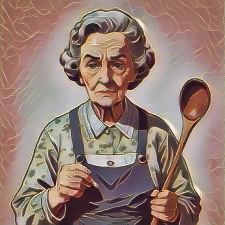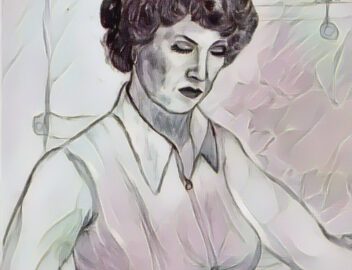(gap: 2s) In the gentle, golden days of my childhood, our small town nestled quietly between rolling green hills and winding country lanes. The air was always fresh, scented with wildflowers and the distant promise of rain, and the sun seemed to shine a little more kindly upon our little world. Our home stood on a tree-lined street, with a neat white gate and a garden brimming with hollyhocks, sweet peas, and the cheerful faces of daisies. Each morning, the birds would sing their bright songs, and the world would awaken with a sense of hope and order.
My family’s house was a place of warmth and gentle routine. Mother, the very heart of our home, was tall and graceful, her hair always swept up in a tidy chignon, not a single strand daring to escape. Her dresses were always pressed and spotless, and her shoes made a brisk, cheerful sound as she moved from room to room, tending to every detail. She had a way of making even the simplest breakfast—porridge with golden syrup, or toast with homemade jam—feel like a special occasion. Her eyes sparkled with kindness, but there was a firmness in her gaze that let us know she meant what she said.
Each day began with a gentle call from Mother, her voice floating up the stairs like a melody. “Time to rise, children! The day is waiting for us.” My sister and I would tumble sleepily from our beds, the morning sun painting patterns on the wallpaper. We would wash our faces in the cool water from the basin, brush our hair until it shone, and dress neatly before coming down to breakfast. Mother believed that a tidy appearance was a sign of respect—for oneself and for others.
After breakfast, we would help with small chores: dusting the sitting room, watering the garden, or folding the laundry with careful hands. Mother would often hum as she worked, her presence filling the house with a sense of calm and purpose. She taught us that every task, no matter how small, was worth doing well. “Order is the foundation of a happy life, and self-control is a treasure,” she would say, her words as gentle as a summer breeze but as steady as the routines that shaped our days.
Our town itself was a place of simple pleasures and honest folk. Children played in the sunlit fields, their laughter ringing out as they chased butterflies or rode their bicycles along the quiet lanes. The corner shop, with its shelves of colourful sweets and jars of humbugs, was a favourite haunt, and the kindly shopkeeper always had a smile for us—though she kept a watchful eye on the sweet jars, for she knew the temptations that could beset even the best of children.
Mother’s values were woven into the very fabric of our days. She believed that discipline was a sign of love, and that every child must learn right from wrong. She taught us to be truthful, to be kind, and to obey our elders. Her rules were clear, and her expectations never wavered. Yet, there was always a gentleness in her manner, a sense that every lesson was given for our own good.
When my sister or I forgot our manners or were disobedient, Mother would correct us with a gentle but firm hand. If I was careless and left my toys scattered about, or if I spoke out of turn at the table, she would say, “Laura, you must stand in the corner and think about your actions.” I would stand quietly, facing the wallpaper patterned with tiny bluebells, listening to the distant sounds of the garden. It was not a cruel punishment, but a time for reflection—a chance to promise myself to do better.
On rare occasions, when I was especially naughty—such as telling an untruth or quarrelling with my sister—Mother would sit me down and explain, in her calm, clear voice, why my behaviour was wrong. “Laura, you know that telling the truth is always best. Because you have chosen to be dishonest, you must receive three smacks on your bare legs, so that you will remember to be truthful in future.” She never raised her voice, and her hand was always gentle, but the lesson was unmistakable. I would receive three firm smacks, and then she would gather me into her arms, holding me close and reminding me that she loved me dearly.
Sometimes, if the mischief was more serious—such as taking a sweet from the jar without asking—Mother would fetch the little wooden paddle that hung in the cupboard, its surface smooth from years of careful use. She would look at me with steady eyes and say, “Stealing is never right, Laura. You must have five smacks on your bare bottom, so that you will remember to always ask before taking.” My heart would beat fast as I fetched the paddle myself, my hands trembling just a little. Mother would seat herself in her favourite chair, and I would go over her knee, the familiar scent of lavender and starch in the air. She would give me five firm but fair smacks, each one a reminder of the importance of honesty. I would try my best to be brave, blinking back a tear, and afterwards she would hold me close, smoothing my hair and whispering, “I know you will do better next time, my dear.”
After every punishment, Mother would send me to the corner once more, so that I might think quietly about what I had learned. My cheeks would be rosy, and sometimes a tear would slip down my face, but I always knew that Mother’s discipline was given with love and for my own good. When she called me back, she would kneel beside me, smoothing my hair and saying, “You are a good girl, Laura. I am proud of you for learning your lesson.”
There were other lessons, too, woven into the fabric of our days. On Sunday mornings, we would walk together to the little church at the end of the lane, the bells ringing out across the fields. Mother would hold our hands as we crossed the road, her grip gentle but sure. In the pew, she would sing the hymns in a clear, sweet voice, and afterwards we would greet our neighbours, exchanging smiles and kind words. At home, we would gather for tea, the table set with a starched cloth and a plate of currant buns, and Mother would remind us to say “please” and “thank you,” to listen politely, and to help clear the table when we were done.
In our home, discipline was never given in anger, but always with kindness and a wish to help us grow into honest, thoughtful children. I am grateful for my mother’s firm hand and loving heart, for she taught me that doing what is right is the greatest adventure of all. And so, in our little house, with its sunlit rooms, gentle order, and the ever-present warmth of Mother’s love, I learned the lessons that would guide me all my life.



























































